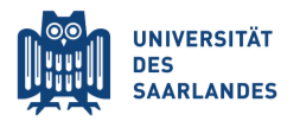Prospects
March 20, 2023 2023-04-13 1:33Prospects
Career Prospects and Entrepreneurship
Due to the rapidly increasing volume of biological, chemical and medical data and their complexity, bioinformaticians have the best career prospects and are sought-after experts at universities, research institutions or pharmaceutical companies. In general, bioinformatics graduates who have studied in Saarbrücken are considered to be very well educated and therefore have good chances on the job market. The English-language master’s and doctorate programs ensure that these opportunities can also be easily taken abroad.
During the studies there are already many opportunities to establish contacts to various research groups, institutes and companies as well as to gain practical experience with real scientific projects. Furthermore, there are programs that offer assistance and support for starting a business.

Doctorate Degree
Those who wish to continue their studies can pursue a doctorate in bioinformatics after their bachelor’s or master’s degree.
Particularly talented bioinformatics students can start their doctoral studies in the graduate school directly after their bachelor’s degree. Students from all over the world are introduced to scientific work in an introductory phase. The students are prepared for the scientific work in three semesters with lectures and seminars. During this preparatory phase, students are supported by the Graduate School through scholarships or auxiliary contracts.
They must then pass a qualification examination, which is followed by the research and dissertation phase. Alternatively, as before, students are also accepted after completing their master’s degree, who are also individually prepared for their research phase and must pass a qualification examination.

Dr. Alexander Rurainski
Interview with former bioinformatics student
When were you at ZBI?
From 2004 to 2010, first as a diploma student, then as an assistant to Prof. Dr. Lenhof. In the latter, I wrote my doctoral thesis and completed my PhD.
What did you work on scientifically? What was the topic of your thesis?
The main focus of my work was mathematical modeling, as well as numerical and algorithmic optimization. These areas, so important for bioinformatics, are indispensable in areas such as molecular force fields, machine learning, and regulatory networks, where I was active. Already my diploma thesis dealt with a special class of problems: "Semidefinite Programming in Bioinformatics". My subsequent research at the Center for Bioinformatics resulted in my dissertation, which was summarized under the title "Optimization in Bioinformatics".
Do you still have contacts from that time?
Yes, in particular I work with people from that time in my own company on a daily basis.
What is the first thing that comes to mind when you think back to your time at ZBI?
I myself experienced the move to the current bioinformatics building and, for example, dismantled, carried and rebuilt computers. Regardless of whether we are talking about the "old" or the "new" building, the room facilities offered/offer optimal working conditions in any case.
What did you like best?
Team spirit and cohesion.
What was bothering you?
As a teaching assistant, it was not always easy to coordinate lectures with my own research.
What was your further career like?
After my PhD, I founded my own biocomputing company with friends from the Center for Bioinformatics, specializing in the analysis and simulation of biological data and pharmaceutical properties: Scientific Consilience (www.scientific-consilience.com). Scientific Consilience GmbH now looks back on more than 5 years of scientific and market success as a full-time company independent of universities.

